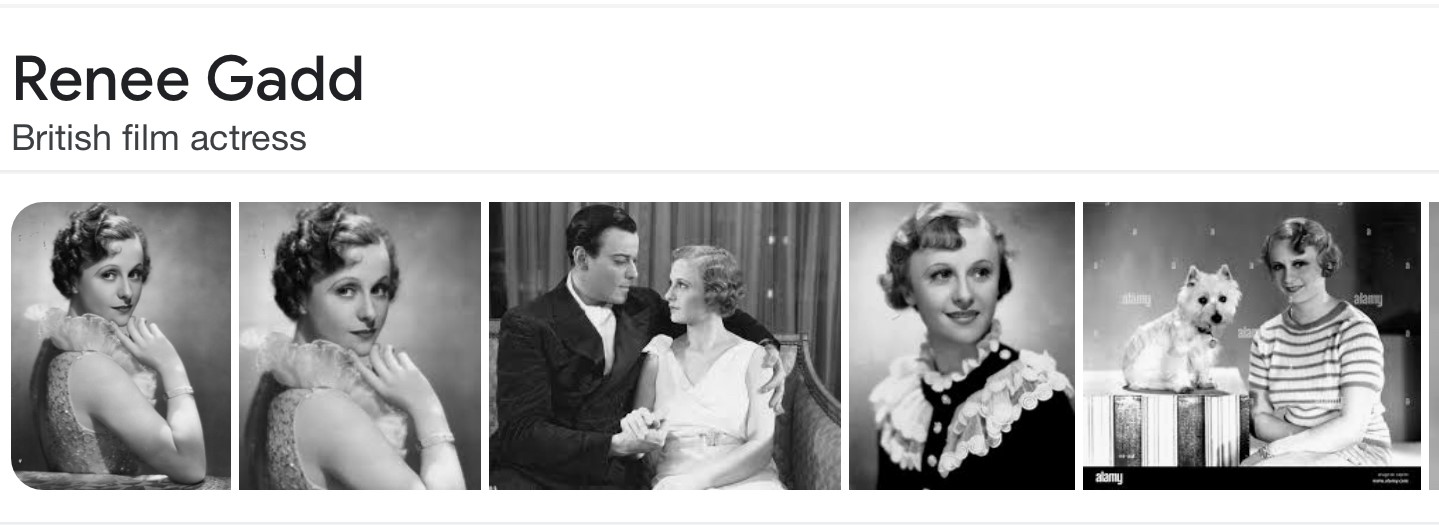Renee Gadd
‘Among the Ginner Mawers who have gone on to do stage work we are proud to number Leslie French, Renee Gadd and Elinor Shan.’ (Irene Mawer, The Link, October 1937, pp.20-23)
Renee Gadd is mentioned in the write-up of the 21st birthday celebrations of the Ginner-Mawer School as being a former pupil who had gone on to do stage work. This was in 1937, and by the end of her career she also had parts in at least 29 films.
I think that of all of the Ginner-Mawer’s so far, she is the one to have achieved the most fame as a performer. Her obituary is quite long, but does not mention where she trained.
Renee is known to have travelled with her mother and siblings from Argentina to England in 1913 when she was about 5 years old, and that she was on the stage in Brighton from at least the age of 14. This would have been c.1922 (her birth date is in question, 1906 or 1908?). Did Renee undertake the three-year, full-time course at Ginner-Mawer? Or was she a Saturday girl, with enough natural talent to make-it without full training? One website says she was a chorus girl in Brighton, while another says that she was acting on stage while in Brighton – so we don’t know whether she trained in one of the arts, or all of them, though her obituary does say dance and drama .
The general consensus is that she was from a British Mother and and American father who had gone to live in Argentina for the father’s work and Renee had been born in Argentina. The family relationship broke down and the mother and the children moved to England, but the family were unable to stay as a unit. The eight children lived in various boarding schools and with a series of aunts and paid carers. Gadd lived with her aunt and began to study dancing, working as a chorus girl in Brighton by the age of fourteen. “Renée’s first know paid work was as a teenage chorus girl in Brighton, using her dancing talent to support her hard-up family, and raising the money to send her sisters to private schools.” I find this note about private schools difficult to accept. Was this item perhaps written by someone who didn’t understand the system of schooling in England? A ‘private’ school is a fee-paying school, quite different to the state school which is provided for free by the government, but would still have required money for books, pens, uniform, meals, outings, etc. If Renee was paying for two girls to attend private school and also to look after her own needs, she was earning very good money – which is hardly likely if she was only a chorus girl, I would assume. Your thoughts?
In 1924, she was cast in a production of Hassan by the powerful theatrical agent Basil Dean, after which she appeared in several musical comedies, then straight plays after becoming a member of a Shakespearian company at Stratford-on-Avon. She enjoyed a series of successful West End roles.
Two years later, and thanks to an audacious letter to the powerful West End producer Basil Dean, she secured a part in his production of James Elroy Flecker’s Oriental fantasy Hassan.
In 1924 she appeared on stage with Fred Astaire in Lady, Be Good, and in 1925 Renee mastered eight changes of costume a night in Rose Marie, at the Theatre Royal in Drury Lane. A year later, she again worked with Astaire in the stage production of Funny Face.
Gadd had a romantic relationship with Astaire off-stage at the time that he was just beginning to become very famous (though it wasn’t until the 1930s that he found superstar levels of fame in the Hollywood musicals).
In 1929 Gadd landed the first of her leading roles in West End plays: The Man Who Kissed His Wife, at the Prince of Wales Theatre, 1930; Supply and Demand at the Theatre Royal, Haymarket, London in 1931; Black Coffee at St Martin’s Theatre, London in 1931.
There followed short episodes of film contracts both in the UK (c.1932/33) and in Hollywood (c.1934/35), which saw her image printed on cigarette cards, after which she returned to Britain and a dwindling career, with small film parts, finishing for good in 1950.
By the time of the Irene Mawer speech in 1937, Renee had worked in a Shakespearean company in Stratford; secured lead roles in at least three West End plays, had a romance with the beginning-to-be-famous Fred Astaire as well as playing alongside him in two West End musicals, and achieved minor success in Hollywood. Not bad for a kid from an unsettled background!
Settling down to a quieter life may have come as a welcome alternative to her stage and film career which sounds to have been quite hectic, including various romances and two failed marriages. I can imagine the stress of flying out to a foreign country and being plunged into the Hollywood scene, expecting to be with the man she thought was her romantic partner, only to find that he was living with another woman, and then having to appear alongside him in a film.
Her life after the glamour of the movies was lived much more quietly in the United States of America and in England. She was nearly 100 years old when she died; the first half her life had been lived as a performer, and the second half had been in contented retirement with her third husband. Finally, after his death, she moved to live in the area where her career first began, the English sea-side town of Hove, which is right next door to Brighton.
—————————————-
The information for this article comes from the following sources: The Independent (newspaper) obituary written by Matthew Sweet, Thursday 31 July 2003; IMDb website; Wikipedia; Theatricalia.

